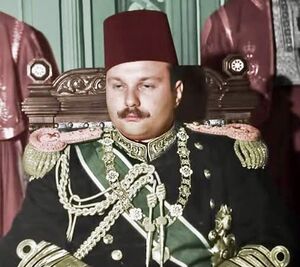Farouk al-Awwal
(king) | |
|---|---|
 | |
| Born | 11 February 1920 Abdeen Palace, Cairo, Sultanate of Egypt |
| Died | 18 March 1965 (Age 45) Capri, Italy |
| Nationality | Egyptian |
| Religion | Islam |
| Spouse | Farida |
Puppet king of Egypt under British rule. Deposed in a 1952 CIA-backed coup. | |
Farouk I (Fārūq al-Awwal) was the puppet King of Egypt and the Sudan under the British "protectorate", succeeding his father, Fuad I, in 1936 and reigning until his overthrow in a CIA-backed military coup in 1952.
Contents
Puppet king
Farouk was the tenth ruler of Egypt from the Muhammad Ali dynasty. Farouk succeeded his father in 1936, and ruled as a British puppet leader, where the British High Commissioner, Sir Miles Lampson, had the real power.[1]
The prince grew up in the very closeted world of the royal palaces, and he never visited the Great Pyramids at Giza until he became king, despite the fact that only 19 kilometres (12 mi) separated the Abdeen Palace from the Pyramids.[2]
In October 1935, Farouk left Egypt to settle at Kenry House in the countryside of Surrey to attend the Royal Military Academy at Woolwich as an extramural student. Farouk attended classes occasionally at "the Shop", as the academy was known, to prepare himself for the entrance exam. Farouk stayed at Kenry House and twice a week was driven in a Rolls-Royce to the Royal Military Academy to attend classes, but still failed the entrance exam. One of Farouk's tutors, General Aziz Ali al-Misri, complained to King Fuad that the principal problem with Farouk as a student was he never studied and expected the answers to be given to him when he wrote his exam. Instead of studying, Farouk spent his time in London where he went shopping, attended football matches with the Prince of Wales, and visited restaurants and brothels.[3]
One of Farouk's mistresses, Irene Guinle, who was his "official mistress" in the years 1941–1943, described him as something of an immature "man-child" having no interest in politics and given to childish behavior like making bread balls at restaurants "to flip at the fancy people coming in and watch how they'd act when he hit the mark. How he roared with that laugh". Guinle in an interview stated: "Farouk never wrote a letter, never read a paper, never listened to music. His idea of culture was movies. He never even played cards until I made the mistake of buying him a 'shoe' and teaching him how to play chemin de fer. He got hooked on that. Farouk was an insomniac. He had three telephones by his bed, which he would use to ring up his so-called friends at three in the morning and invite them to come over to his palace to play cards. No one could refuse the king".[4]
From an early age, Farouk was interested in collecting. He had vast land holdings, more than a hundred cars and immense collections of coins and jewels. In addition, King Farouk gathered one of the world’s largest collections of pornography.[5] During his life, Farouk was also known for collecting women. He married at least two times, and had multiple affairs, the most notable of them being with Irene Guinle, Capece Minutolo and the British writer, Barbara Skelton.[5]
1952 Coup
Farouk was always very anti-communist, but by 1952, a conviction arose among American decision-makers that based on the way that things were going in Egypt, a communist revolution was inevitable unless the government started social reforms at once.[6] US Ambassador Jefferson Caffery reported to Washington that the Egyptian Communist Party was growing in popularity and it was the Egyptian Communists who were behind the "Black Saturday" riot.[7] In what became known as Project FF (Fat Fucker), officers of the Central Intelligence Agency led by Kermit Roosevelt Jr. were in contact with Free Officers,[6] who staged a coup.
Exile
In the aftermath of the coup, King Farouk was forced into exile. The speedy exit caused the king to leave behind many of his treasures. The fortunes he left in Egypt included much of the royal jewel and coin collections, as well as thousands of suits, and thousands of pornographic neckties from his adult-themed collection. He did manage to keep much of his wealth, smuggling bars of gold out of Egypt. During his exile, King Farouk continued his luxurious lifestyle.
In 1965, the forty-five year old king died in Rome, after eating a rich feast while in the company of a twenty-two year old woman.[5] There were rumors the death was in reality a poisoning by the Egyptian secret services of President Gamal Abdel Nasser, the reason being that the Saudi royal family was scheming to put him back on the throne.
References
- ↑ https://www.theamericanconservative.com/the-irresistible-king-farouk/
- ↑ Stadiem, William (1991). Too Rich: The High Life and Tragic Death of King Farouk. New York: Carroll & Graf Pub. ISBN 0-88184-629-5. page 119
- ↑ Stadiem, William (1991). Too Rich: The High Life and Tragic Death of King Farouk. New York: Carroll & Graf Pub. ISBN 0-88184-629-5. page 119-123
- ↑ Stadiem, William (1991). Too Rich: The High Life and Tragic Death of King Farouk. New York: Carroll & Graf Pub. ISBN 0-88184-629-5. page 64
- ↑ a b c https://thehistorianshut.com/2017/07/23/the-arousing-treasures-of-farouk-i-the-former-king-of-egypt/
- ↑ a b Stadiem, William (1991). Too Rich: The High Life and Tragic Death of King Farouk. New York: Carroll & Graf Pub. ISBN 0-88184-629-5. pages 12-13
- ↑ Stadiem, William (1991). Too Rich: The High Life and Tragic Death of King Farouk. New York: Carroll & Graf Pub. ISBN 0-88184-629-5. page 7